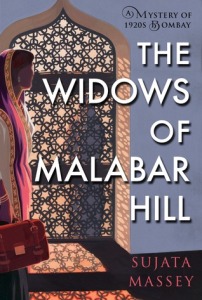 Sometimes I end up reading books that are unexpectedly timely. Case in point: The Widows of Malabar Hill. I picked it up for the mystery, the exotic setting and the historical time period (India 1916-21), but I ended up really appreciating its relevance to current women’s issues. Watching the Golden Globes on Sunday night, I was reminded of the strong, intelligent main character, Perveen Mistry. She is based on the real-life Cornelia Sorabji, one of the first Indian female lawyers, and like Cornelia, Perveen faces discrimination because of her gender and her race in colonial India.
Sometimes I end up reading books that are unexpectedly timely. Case in point: The Widows of Malabar Hill. I picked it up for the mystery, the exotic setting and the historical time period (India 1916-21), but I ended up really appreciating its relevance to current women’s issues. Watching the Golden Globes on Sunday night, I was reminded of the strong, intelligent main character, Perveen Mistry. She is based on the real-life Cornelia Sorabji, one of the first Indian female lawyers, and like Cornelia, Perveen faces discrimination because of her gender and her race in colonial India.

The book alternates between two narratives. The first, which takes place in 1921 Bombay, follows Perveen as she represents three purdahnashins, women who lived in seclusion according to their religious custom. When their husband dies, his estate manager demands their inheritance, then is mysteriously killed. Moved by the plight of the women, who have no contact with the outside world and are forbidden from seeing men, Perveen seeks justice for them but ends up in danger herself.
The second story line goes back a few years, to 1916, when Perveen marries, leaving her progressive parents behind in Bombay and moving to Calcutta to join her new in-laws. However, she finds that her marriage, and her place within it, are not at all what she expected.
If you’ve been looking for a new mystery series, look no further. Beyond the issues about women’s rights and the whodunit plot, Perveen is a compelling, relatable character. It’s also fascinating to learn about the various cultures interwoven into the fabric of India, and imagining the richly described world of 1920’s Bombay. I can’t wait for the next book in the series!
For more info about this book, as well as the places depicted in it, see the author’s web site at sujatamassey.com.
Discover more from Cook Memorial Public Library District
Subscribe to get the latest posts sent to your email.
Categories: Books and More
